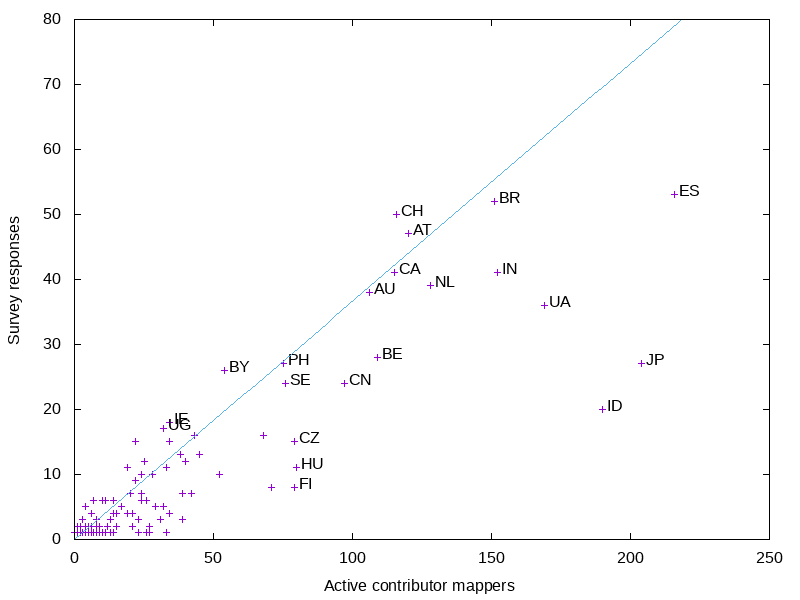The board has started releasing results from their 2021 survey. I’ve done some analysis on the response rates by country.
There’s lots of data for activity on OSM by country, but for this I took the numbers from joost for how many “active contributors” there are according to the contributor fee waver criteria.

For the larger countries, Russia is the most underrepresented country. This is not surprising, as they are underrepresented in other venues like the OSMF membership.
The US and UK are both slightly overrepresented in the survey, but less so than I would have expected based on other surveys and OSMF membership.
The smaller countries are all crowded, so I did a graph of just them.

As with other surveys, Japan is underrepresented. Indonesia, although underrepresented is less underrepresented than I would have expected.

Discussion
Awennit n ImreSamu di 17 February 2021 ɣef 23:58
HU: underrepresented
probably related to the missing hungarian translation. ( next time … )
Awennit n Stereo di 18 February 2021 ɣef 14:43
Is the blue line simply a linear regression?
Obligatory https://xkcd.com/2048/
Awennit n pnorman di 18 February 2021 ɣef 17:59
Not quite - it’s a linear regression forced through the origin, weighted by number of responses.
Awennit n pnorman di 19 February 2021 ɣef 18:31
I wouldn’t assume it’s due to the lack of a Hungarian translation. Japan, Indonesia, and Russia all had similar response rates as Hungary and Japanese, Indonesian, and Russian were all provided languages.
I have access to some other by-country usage stats and want to see the relationship between them and survey responses, but that analysis will take more time and I won’t get to it this week.
Awennit n westnordost di 19 February 2021 ɣef 22:06
Oh, when looking at the graph, I thought that the blue line was fitted so DE would be the reference point (=neither over nor underrepresented).
Anyway, thanks for the analysis!
Awennit n SK53 di 21 February 2021 ɣef 13:26
I think one issue might be many of the provided links were to documents in English. There was a lot of material to take in if this was a language one was not comfortable with for reading, and perhaps automated translations are confusing too (quite likely given the content).
Also if the content was new to the participant this would also be a hurdle.
Most of the content would have been covered by weeklyOSM, but I’m not sure how extensive RU & JA translations have been throughout the year. There is no coverage of HU & ID by weeklyOSM. Also Zverik did not cover the survey on ШТОСМ which may have elicited more interest from Russian-speakers.